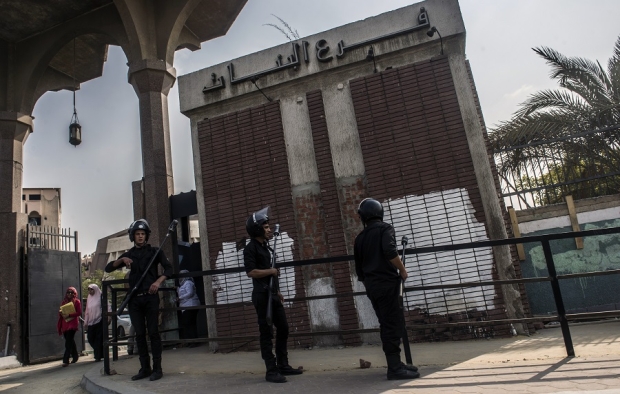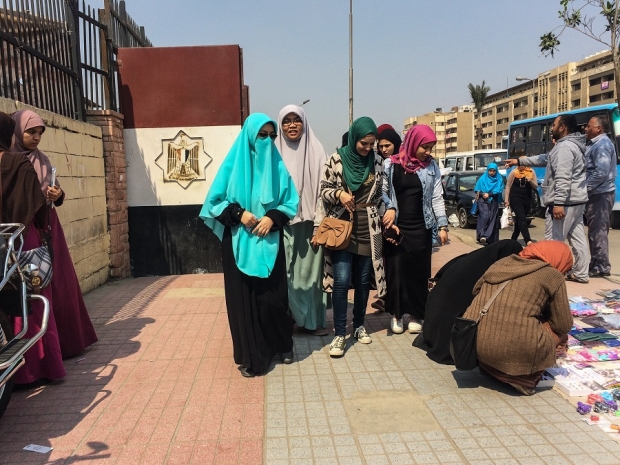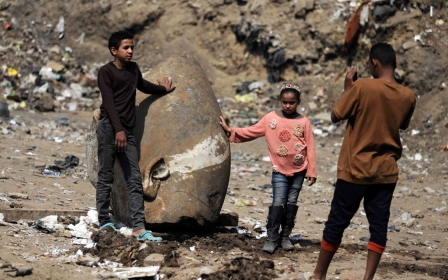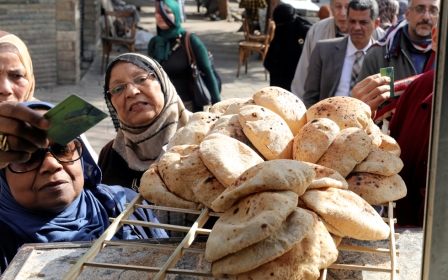'I wouldn’t come back to Egypt if they paid me to': Azhar's foreign students fear police

CAIRO - Every time Armando passes by a policeman on the street, his body tenses up. "I don't like the police," he said. In fact, he steers clear of them and tries to go unnoticed by keeping his beard shaved.
Shortly after converting to Islam, the Colombian native - who preferred not to use his real name for security reasons - decided to move to Cairo and study at Al-Azhar University, one of the main centres of Sunni Muslim learning.
Armando hopes to one day be a religious scholar in his home country. Though he expected that being away from his family and learning Arabic would be difficult, during the two years he has been studying there, he soon realised that navigating the police state was a bigger challenge.
'Tough on students'
“The state is really tough on students,” he told Middle East Eye.
He recalled an experience that took place two months into his move to Egypt, saying that on his way home from the university, he offered to help a police officer who was struggling to move a table.
“[The police officer] started yelling and reacted aggressively,” Armando said, adding that he had decided to walk away, when several police officers grabbed him.
Armando was then taken to the Nasr City police station for further questioning and investigations. When the police officers realised he was a foreigner, their aggressive attitude towards him multiplied.
'As a convert who is interested in learning about Islam, I am suspected to be a potential ISIS recruit'
- Armando, Azhar student
Unable to speak Arabic at the time, Armando did not understand what they were yelling about.
“I was wearing a koofi skullcap and I had a beard. They kept asking me about everything: 'Why are you studying here? What is this perfume?''' he said.
“Then they began looking through my phone, looking at photos of my mother and other photos that were private, but I showed them everything. I had nothing to hide,” he added.
The officer then opened his Facebook account and went through his browser history. After a few hours, he was finally allowed to leave the police station because the officer could not find anything incriminating against him.
Following this incident, Armando was stopped and interrogated again at two different checkpoints on his way back home. He assumed that security forces were instructed to monitor him after being released.
“As a convert who is interested in learning about Islam, I am suspected to be a potential ISIS [Islamic State group] recruit. They think we want to go fight in Sinai or something,” Armando told MEE.
In 2015, Egypt's interior ministry released a statement stipulating that foreign students at al-Azhar were being recruited by the Islamic State group (IS) and that they had arrested two students from Tajikistan for having alleged IS affiliations, according to news reports.
Arrests and disappearances
Earlier this month, the interior ministry issued a statement saying that an Al-Azhar student was shot dead during a raid in Ismailia governorate, east of Cairo, claiming that he had fired first.
The Egyptian student, Hassan Galal Mustafa, was accused of being affiliated with the Muslim Brotherhood. Since 2013, the Islamic organisation has been labelled a ”terrorist” group by the government. His family, however, said that he had been disappeared on his way to university in December 2016 and was killed while in police custody, according to a statement issued by the Muslim Brotherhood's political wing, The Freedom and Justice Party.
In another case that occurred in January, a Turkish friend of Armando’s was detained for 10 days after a policeman saw him using his mobile phone to take a photo of the sky in a street in Nasr City. The young Turkish man was too scared to come forward and speak to the media about his ordeal.
“After spending all these nights in the station, they let him go and told him, oh sorry we were just investigating,” he said.
In 2016, two Turkish brothers, who were studying at Al-Azhar, were detained at their home in Cairo by security forces.
According to Armando, police are usually suspicious of students from Chechnya, Kosovo, Turkey and Albania, and they even spy on mosques in Nasr City, where many students live.
“If I go to jail, I have no family here [and] no one will know where I am,” Armando told MEE.
“I have to keep this from my mother when I speak to her of course, because she will tell me to go back to Colombia,” he added.
Due to fears of possible interrogation and deportation at the airport in going back to Columbia, he plans not to leave Egypt for at least another four years, until his studies have been completed.
While there are no specific statistics documenting police harassment of students, Mohamed AbdelSalam, a researcher at the Association for Freedom of Thought and Expression (AFTE), told MEE that state security places close surveillance on foreign students.
"Students at al-Azhar University are seen as somehow associated with the Muslim Brotherhood and that’s why police are harsher with them," he said.
Al-Azhar University had emerged as a hotspot for protests against the 2013 military coup that toppled president Mohamed Morsi, a leading member of the Muslim Brotherhood.
'If I go to jail, I have no family here [and] no one will know where I am'
- Armando, Azhar student
Police forces clashed with students inside campuses, which lead to the death of at least 20 students and the arrest of hundreds in many universities across Egypt including Al-Azhar since 2013, according to AFTE.
Yet the leaders of Al-Azhar have long lent their support to those in power by backing government policies, including their stance against the Muslim Brotherhood. When General Abdel Fattah al-Sisi appeared on television to announce that he had deposed the first freely elected leader, the grand imam of Al-Azhar, Ahmed al-Tayeb, was among those who stood at his side, expressing solidarity with the coup.
The Al-Azhar mosque has stood tall in Cairo since the 10th century and is considered to be one of the oldest mosques in Egypt. It launched a university that initially taught Shia Islam until the end of the Fatimid Caliphate in 1171. Later it turned into a Sunni mosque and university that has taught the four schools of mainstream Sunni Islam.
Around 45,000 students mainly from countries across Asia and Africa study at the renowned university.
In February, the Malaysian minister of higher education said the Malaysian government would no longer be providing students with scholarships to Egypt “as the situation in that country is still not completely stable,” according to local news reports.
Tightening visa and residency procedures
A group of Nigerian students studying at Al-Azhar, who have been living in Egypt for the past five years, told MEE that while the initial period of their move came with its own difficulties, the government has been especially tough with issuing paperwork and visas over the past three years.
Adjumu Jeleel said that many of his friends and colleagues who study at Al-Azhar have been arrested by police in the last two years “for no reason… without committing a crime,” for simply being students there.
He added that the arrests tend to increase during November, December and January when the student’s residency papers usually expire.
“It is very dangerous for us to go out without our residencies,” he said.
Another Al-Azhar student, Hanga, said the police usually raid the neighbourhoods where foreign students reside during these times.
'I wouldn’t come back to Egypt if they paid me to'
- Foreign student
He recalled that last year at least 20 Nigerian students of Al-Azhar were deported. Security forces claimed that they did not have the proper paperwork, but Hanga said it was a systematic crackdown from the security forces on Al-Azhar’s students.
“Why is the government being so tough on the students?” Jaleel said.
Jeleel and Yusuf told MEE they would not recommend studying in Egypt to Nigerian students. “If there is a better alternative than Egypt, I would tell them to go there instead.”
For Armando, the Colombian student, racism sometimes also comes into play. By Armando's accounts, an Afro-Brazilian friend of his who was also studying in Cairo said he had experienced racist and aggressive encounters with Egyptian authorities.
“I wouldn’t come back to Egypt if they paid me to."
This article is available in French on Middle East Eye French edition.
Middle East Eye propose une couverture et une analyse indépendantes et incomparables du Moyen-Orient, de l’Afrique du Nord et d’autres régions du monde. Pour en savoir plus sur la reprise de ce contenu et les frais qui s’appliquent, veuillez remplir ce formulaire [en anglais]. Pour en savoir plus sur MEE, cliquez ici [en anglais].






